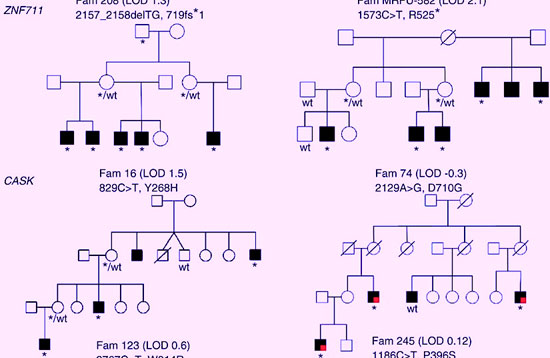26 2015 -- Scientists searching for the genetic roots of autism have found something surprising. A study of almost 2400 children with autism their parents and unaffected siblings has provided new insights into the genetics of the condition.
 X Chromosome Helps Unravel Complex Genetics Of Autism Spectrum Autism Research News
X Chromosome Helps Unravel Complex Genetics Of Autism Spectrum Autism Research News
Most experts agree there is a hereditary component at works when a child develops autism in the womb according to the researchers.

Which parent carries autism gene. In such instances an autism-causing genetic mutation is already present in the family. Mothers with high polygenic scores tend to have autism-related traits especially pragmatic-language difficulties the researchers found. However the authors of this paper theorize autism is inherited in a minority of cases.
Girirajan explains that in 95 percent of children who carry 16p121 the mutation has been passed on from a parent. If the mother carries the gene mutation there is a chance she will pass the disruption to her children and if that child is male he will likely develop autism but if that child is female she is less likely to. Severe gene-disrupting de novo mutations are thought to be capable of causing the disorder in certain instances.
Researchers have assumed that mothers are more likely to pass on autism-promoting gene variants. The theory that parental practices are responsible for ASD has long been disproved. The findings support the idea that women can sustain a larger genetic hit than men without having autism a phenomenon called the female protective effect says Donna Werling assistant professor of genetics at the University of.
Environmental factors may also play a role in gene function and development but no specific environmental causes have yet been identified. Now a sweeping new study looking at more than 2 million people from five countries Denmark Finland Sweden Israel and Australia found that about 80 of an individuals risk of developing autism comes from inherited genetic factors and not from environmental influences meaning anything other than changes to a genes DNA. New research shows that diminished motor skills correlate with the severity of de novo mutations.
Fallin and her research team studied the epigenetic tags from the DNA found in 44 fathers sperm. They found 69 genes. Neuroscientists Illuminate Role of Autism-Linked Gene May 25 2016 Neuroscientists have found that loss of the autism-linked Shank gene prevents brain synapses from maturing in a study of fruit.
In families where two children have been diagnosed with the disorder siblings dont often. More broadly the study calls attention to the role played by genetics in diminished cognitive functions in children across the autism. Researchers found that certain inherited mutations.
What are the odds a boy will inherit the gene from the mother. A large international study of the genes that predispose people to autism spectrum disorders ASD suggests that the same gene variants are also present in the wider population where they can contribute to a range of behavioural and developmental traits with lesser severity than clinical ASD. Thats because the rate of autism in women is much lower than that in men and it is thought that.
Researchers from UCLA Stanford University and three other institutions used a technique called whole genome sequencing to map the DNA of 2300 people from nearly 500 families. A parent who has inherited it carries a mutated gene in virtually every cell in. The researchers then used genetic data to calculate each family members polygenic score the sum total of all gene variants tied to autism that are present in their DNA.
Autism is more common in children born prematurely. But these findings further suggest that autism is a genetically complex disease Dr. This means that any difference in clinical features between the parent.
Mutations that appear in a child which are not present in either parentcalled de novo mutationscan be important in autism. According to some estimates hundreds of genes may be associated with autism spectrum disorders ASD but it has been difficult to determine which mutations are truly involved in the disease and. Genetic mutations found in the child with autism that were not found in either parent are likely not associated with autism one of the studies concluded.
Turners team linked 22 genes to conditions of brain development in a sample of women versus 18 genes in twice as many men. By contrast the fathers polygenic scores do not.